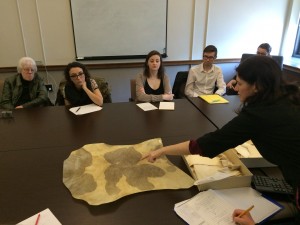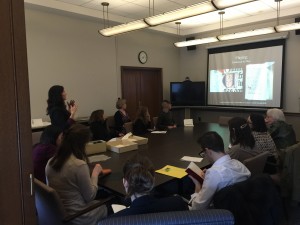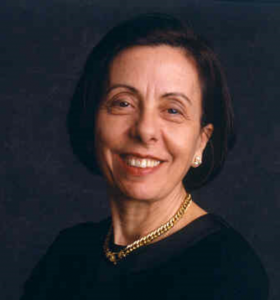Below, please find a list of undergraduate Medieval & Renaissance courses being offered in fall 2016. For a list of graduate courses, please visit this page on our website. For the most up-to-date information, please visit the Columbia Directory of Classes.
ART HISTORY AND ARCHAEOLOGY
AHIS UN2800 Arts of Islam. Matthew Saba. TR 4:10pm-5:25pm. 612 Schermerhorn Hall.
Undergraduate survey course.
AHIS BC3350 Medieval Art in the West. Joseph S. Ackley. TR 1:10-2:25 pm. Location TBC.
A survey of medieval art and architecture from Late Antiquity to c. 1400. Questions of iconography, function, and historical context will be interwoven with those of style, material, and craft. Late Antique, Byzantine, and early Islamic (Umayyad and Abbasid) art, as well as that of the Migration Era (Merovingian, Visigothic, and other Germanic cultures), will be briefly reviewed, after which the course will explore in depth the diverse artistic traditions of medieval Europe, including Insular, Carolingian, Anglo-Saxon, Ottonian, Mozarabic, Romanesque, and Gothic art. The course concludes with a nod towards van Eyck, Alberti, and early-fifteenth-century painting. Key thematic questions throughout include strategies of picturing, manifesting, and touching God; cross-cultural exchange between West and East; the relationship between Church and court; and the intersection of politics, religion, and economics embodied by so much of medieval art. The course will emphasize both the figural arts of painting and sculpture and the precious arts of metalwork, ivory, and textiles; architecture will be discussed as necessary.
AHIS GU4627 Life of a Cathedral: Notre Dame. Stephen Murray. T 10:10am-12pm. 832 Schermerhorn Hall.
Like a great city, the cathedral brings together multiple segments of society in lively collaboration and conflict. We will explore the three overlapping worlds of the cathedral: the world of the clergy (owners and principal users), the world of the layfolk (parishioners, townsfolk and pilgrims) and the world (most mysterious) of the architects, or master masons. The semester is thus divided into three parts: each class will be preceded by an intense look at a specific aspect of the life of the cathedral and a reading presented by one of the participants as specified in the schedule below. Participants in the class will also be invited to contribute to the development of a new website on the cathedral, designed for the use of Art Humanities students.
EAST ASIAN LANGUAGES AND CULTURES
Chinese GU4507 Readings in Classical Chinese. Wei Shang. TR 10:10am-11:25am. 412 Pupin Laboratories.
Prerequisites: CHNS W3302 or the equivalent. Admission after placement exam. Focusing on Tang and Song prose and poetry, introduces a broad variety of genres through close readings of chosen texts as well as the specific methods, skills, and tools to approach them. Strong emphasis on the grammatical and stylistic analysis of representative works.
ENGLISH & COMPARATIVE LITERATURE
ENGL BC3135 Wit & Humor in the Renaissance. Anne Prescott. MW 1:10pm-2:25pm.
ENGL UN3145 Literature of Medieval Courts: Medieval Performance. Susan Crane. T 12:10pm-2pm.
Britain’s medieval aristocrats lived in the public eye, staging an array of elite performances including tournaments, coronations, weddings, hunts, and feasts. These performances were memorably lavish and entertaining, but more importantly, they asserted the aristocracy’s superiority and power. This seminar will explore an archive of poetic and historical texts concerning the ritual and performative strategies of aristocratic courtship, heraldry, and chivalry. Ecclesiastical courts, in turn, develop an alternate nobility of faith as they elevate saints and condemn heretics. The seminar’s persistent areas of inquiry will be into how medieval people conceived and performed their personal identity, and how social groups deployed public performances to claim social authority. Texts will include Chaucer’s Knight’s Tale, saints’ legends, the romances of Silence, The Knight of the Swan, and Sir Gawain and the Green Knight, and the minutes of the trial of Joan of Arc. Course requirements: weekly posts, a midterm paper of about 5 pages, a workshop presentation with annotated bibliography, and a research paper of about 20 pages.
ENGL BC3154 Chaucer Before Canterbury. Christopher Baswell. TR 10:10am-11:25am.
Chaucer’s innovations with major medieval forms: lyric, the extraordinary dream visions, and the culmination of medieval romance, Troilus and Criseyde. Approaches through close analysis and feminist and historicist interpretation. Background readings in medieval life and culture.
ENGL BC3164 Shakespeare II. Peter Platt. MW 8:40am-9:55am.
CLEN GU4021 European Literature in the Middle Ages: Culture of the Book. Christopher Baswell. TR 6:10pm-7:25pm. 702 Hamilton.
ENGL GU4103 English Literature 1500-1600. Alan Stewart. MW 8:40am-9:55am. 214 Pupin Laboratories.
(Lecture). This lecture course examines sixteenth-century English literature in the light of the new religious, social and political challenges of the period. Texts, primarily poetry and prose, include lyric poetry by Thomas Wyatt, Henry Howard, earl of surrey, and John Donne; sonnet sequences by Philip Sidney and William Shakespeare; early narrative works by George Gascoigne and Thomas Nashe; works of Early English literary criticism; travel writings by Walter Ralegh and Thomas Harriot; as well as longer texts including More’s Utopia and Spenser’s Faerie Queene.
ENGL GU4702 Tudor-Stuart Drama. Jean Howard. TR 4:10pm-5:25pm. 517 Hamilton.
(Lecture). This course investigates plays that treat historical themes as well as theories of historical and documentary drama. We will consider each playwright’s sources and techniques, the historical conditions of each play’s first production, and the play’s reception history. We will also consider certain suggestive resonances between the disciplines of theatre and history. Plays by Aeschylus, Cervantes, Lope de Vega, Marlowe, Shakespeare, Ford, Schiller, Goethe, Büchner, Shaw, Brecht, Weiss, Churchill, Parks, and others.
FRENCH AND ROMANCE PHILOLOGY
FREN GU4301 French Literature of the 17th Century. Pierre Force. W 4:10pm-6pm.
HISTORY
HIST BC1062 Introduction to the Later Middle Ages. Joel Kaye. TR 11:40am-12:55pm.
HIST UN2060 Laws of War in the Middle Ages. Adam Kosto. MW 10:10am-11:25am. 313 Fayerweather.
The perception and regulation of war and wartime practices in Europe and the Mediterranean World in the period 300-1500, from the standpoint of legal and institutional history rather than of military history. Topics include: the Just War tradition, Holy War and Crusade, the Peace and Truce of God, prisoners and ransom, the law of siege, non-combatants, chivalry, and ambassadors and diplomacy. Readings are principally primary sources in translation.
HIST UN2657 Medieval Jewish Cultures. Elisheva Carlebach. MW 2:40pm-3:55pm. 310 Fayerweather.
This course will survey some of the major historical, cultural, intellectual and social developments among Jews from the fourth century CE through the fifteenth. We will study Jewish cultures from the Christianization of the Roman Empire, the age of the Talmuds, the rise of Islam, the world of the Geniza, medieval Spain, to the early modern period. We will look at a rich variety of primary texts and images, including mosaics, poems, prayers, polemics, and personal letters. Field(s): JEW/MED
History: Middle East UN2810 History of South Asia I. Manan Ahmad. MW 8:40am-9:55am. 103 Knox Hall.
This survey lecture course will provide students with a broad overview of the history of South Asia as a region – focusing on key political, cultural and social developments over more than two millennia. The readings include both primary sources (in translation) and secondary works. Our key concerns will be the political, cultural and theological encounters of varied communities, the growth of cities and urban spaces, networks of trade and migrations and the development of both local and cosmopolitan cultures across Southern Asia. The survey will begin with early dynasties of the classical period and then turn to the subsequent formation of various Perso-Turkic polities, including the development and growth of hybrid political cultures such as those of Vijayanagar and the Mughals. The course also touches on Indic spiritual and literary traditions such as Sufi and Bhakti movements. Near the end of our course, we will look forward towards the establishment of European trading companies and accompanying colonial powers.
ITALIAN
ITAL GU4009 Development of Italian Language. Jo Ann Cavallo. M 2:10pm-4pm.
The external history and internal development of the Italian language from its origins to the present.
ITAL GU4050 Medieval Lyric. Teodolinda Barolini. T 4:10pm-6pm. 702 Hamilton Hall.
This course maps the origins of the Italian lyric, starting in Sicily and following its development in Tuscany, in the poets of the dolce stil nuovo and ultimately, Dante. Lectures in English; text in Italian, although comparative literature students who can follow with the help of translations are welcome.
ITAL GU4097 Boccaccio’s Decameron. Teodolinda Barolini. R 4:10pm-6pm. 516 Hamilton Hall.
While focusing on the Decameron, this course follows the arc of Boccaccio’s career from the Ninfale Fiesolano, through the Decameron, and concluding with the Corbaccio, using the treatment of women as the connective thread. The Decameron is read in the light of its cultural density and contextualized in terms of its antecedents, both classical and vernacular, and of its intertexts, especially Dante’s Commedia, with particular attention to Boccaccio’s masterful exploitation of narrative as a means for undercutting all absolute certainty. Lectures in English; text in Italian, although comparative literature students who can follow with the help of translations are welcome.
LATIN AMERICAN & IBERIAN CULTURES
SPAN UG3821 Andalusian Iberias. Seth Kimmel. MW 11:40am-12:55pm.
The relationship between the Spanish, Latin, Arabic, and Hebrew literatures of the Iberian Peninsula has been hotly contested over the last fifty years. This class is an introduction to these debates about the development of literary genre, the transmission of philosophical knowledge, and the history of religious polemic in medieval and early modern Iberia. We will study not only the conventions that structure the different religious, linguistic, and political communities of the peninsula, but also the multiplicity of Andalusian Iberias produced by the interactions among them.
We will concentrate on the pre-modern period of Muslim presence on the Iberian Peninsula—between the Berber invasions that started in 711 and the expulsion of the Moriscos at the beginning of the seventeenth century—but we will address questions that remain important today: What constitutes conclusive evidence in literary analysis? What is the relationship between literary or cultural forms and imperial power? Compared with various political, economic, and aesthetic categories of investigations, how much analytical importance does religious difference carry?
MIDDLE EASTERN, SOUTH ASIAN & AFRICAN STUDIES
Middle East GU4721 Epics & Empires. Hamid Dabashi. T 2:10-4pm.
The purpose of this course is an examination of the genre of epic and its narrative connection to empire-building. The primary text that will be used in this critical examination is the Persian epic poem Shahnameh, composed by Abolqasem Ferdowsi circa 1000 CE.
RELIGION
RELI UN3425 Judaism and Courtly Literature in Medieval and Early Modern Iberia and Italy. Isabelle Levy. MW 10:10am-11:25am. 628 Kent Hall.
The course explores secular Jewish literature composed in the medieval and Early Modern Mediterranean in the context of its Arabic and Romance-language counterparts. After examining the literary, linguistic and philosophical backdrop of Jews in the Islamic Empire, we will focus on poetry and prose of al-Andalus, Christian Spain and Italy. We will look at examples of how Jews depicted themselves and how Christian and converso thinkers portrayed Jews. In addition, we will consider two crossover writers, one Jew in Spain and one in Italy, whose compositions in Castilian and Italian were accepted and integrated into Christian society. Historical materials will accompany textual examples, which span the eleventh through sixteenth centuries.
All readings are in English, but all texts will be made available in the original language, and students are encouraged to read in the original whenever possible. The course qualifies for Global Core.
WOMEN’S & GENDER STUDIES
Women’s Studies UN3900 Reading and Writing (on) the Body in the Francophone Middle Ages. Eliza Zingesser. T 2:10pm-4pm. 754 EXT Schermerhorn.
In this course, we consider the body both as a site for textual production—the animal skin used to make medieval parchment—and as an object of representation in medieval francophone literature. How does the choice of literary genre inflect the presentation of gender? What characterized the corporeality of the medieval hero? How did writers depict themselves and the objects of their desire? When genitalia “speak for themselves,” as in some the medieval fabliaux we will read, what do they say and whose desire do they express? Which bodies are clearly gendered and why? How does bodily metamorphosis intersect with sexual transgression and other kinds of gender trouble?
Class discussion in English, with readings available in both modern French and English. The course can be taken for French credit if students complete the reading and all assignments in French.
Women’s Studies UN3514 Historical Approaches to Feminist Questions: Debates on Women in the Premodern World. Julie Crawford. R 2:10pm-4pm. 754 EXT Schermerhorn.
This class is an introduction to the debates on women that played a dominant role in both the philosophical and literary traditions of the European/Atlantic world from the classical period through the seventeenth-century. Beginning with the works of ancient political theory that actively debated women’s political, social, and ethical position in society (chiefly Aristotle, Plato, and Plutarch), the course will address the pan-European books of “Good Women” that served as exemplary case studies, the querelle des femmes (or debate on women) that dominated political and humanist discourse of the sixteenth and seventeenth centuries, and the crucial importance of the political analogies between the household and the state and the marital and social contracts in the premodern world (and, indeed, in our own). We will study works from ancient Greece and Rome and medieval and early modern Italy, Spain, France, England, Ethiopia and Mexico, and topics ranging from domestic violence and political resistance theory to transvestitism and lesbianism.





